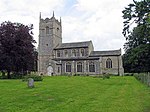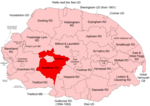Buckenham Tofts (or Buckenham Parva; Little Buckenham) is a former civil parish, now in the parish of Stanford, in the Breckland district, in the county of Norfolk, England, situated about 7 miles north of Thetford, and since 1942 situated within the Stanford Training Area, a 30,000-acre military training ground closed to the public. It was situated about one mile south of the small village of Langford, with its Church of St Andrew, and about one mile west of Stanford, with its All Saints' Church and one mile north of West Tofts, with its Church of St Mary, all deserted and demolished villages. None of these settlements (except West Tofts) are shown on modern maps but are simply replaced by "Danger Area" in red capital letters. In 1931 the parish had a population of 60. On 1 April 1935 the parish was abolished and merged with Stanford.It is situated within Breckland heath, a large area of dry sandy soil unsuited to agriculture. The parish church of Buckenham Tofts, dedicated to St Andrew, was demolished centuries ago and stood to the immediate north of Buckenham Tofts Hall, the now-demolished manor house, as is evidenced by a graveyard which was discovered in that location. The parishioners, few as they were, used nearby St Mary's Church, West Tofts, one mile to the south, where survive 18th-century monuments to the Partridge family of Buckenham Tofts. In 1738 the Norfolk historian Blomefield stated of Buckenham Tofts "there is nothing remaining of this old village, but the Hall, and the miller's house". The ancient manor house was rebuilt in 1803 by the Petre family in the Georgian style and on a grand scale, was sold with the large estate in 1904 and was finally demolished by the army in 1946, having suffered major damage from military training exercises and shelling. In the early 21st century the remains of the manor house were described as follows: "a grassy platform of raised ground and beside a short line of dilapidated stone steps. The raised ground made a sort of elevated lawn, large enough for a tennis court or two, and the steps went to the top of the platform, and then went nowhere."












